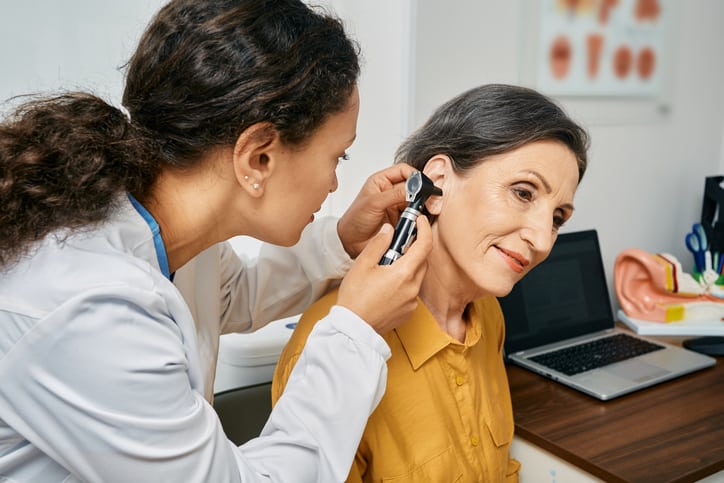Congratulations! You have already taken the most critical step in recovering from your tinnitus: consulting a physician. Tinnitus has only one real power over you; fear of an unknown future. Having a diagnosis gives you a path forward. The next step for you is finding the right doctor to see about your tinnitus.

After a diagnoses of tinnitus, you should consult with an Ear, Nose, and Throat (ENT) specialist. An ENT will conduct an examination (inspection of the face, ears, nose, throat, and neck). They will then check for hearing loss and use pressure testing to examine the eardrum for fluid.
Tinnitus is a symptom, not a disease. Therefore, an ENT is the only doctor who can help you identify a treatable cause. Keep reading to find out what some treatable causes are.
Related: Having trouble sleeping because of tinnitus? Read this article on how to quickly fall asleep.
Treatable conditions that can cause tinnitus.
An ENT will use your tinnitus diagnosis to help you find and treat a host of underlying conditions that might be causing it. In many cases, these treatments may end your tinnitus.
Medications that can cause tinnitus. Some medicines are considered “ototoxic.” Ototoxic (ear poisoning) medicine can cause hearing and balance problems when taken at certain levels.
Known ototoxic medicines include aspirin, ibuprofen, naproxen, certain antibiotics, and cancer treatments, as well as some diuretics. If your doctor permits it, reducing or eliminating the use of these medicines may prevent further damage, even if your tinnitus doesn’t cease.
Physical problems within your ear canal can cause tinnitus. For example, impacted ear wax, fluid build-up, infections, Otosclerosis, tumors, other inner ear growths, and issues with your Eustachian Tube can cause tinnitus.
Once addressed by your doctor, these potentially treatable conditions can put a permanent end to the ringing in your ears.
Hearing loss. Hearing loss is often associated with tinnitus, even when the patient is unaware they are suffering from it. Once this is diagnosed, treatment could range from masking with background sounds at night to the use of hearing aids.
Related: Is your tinnitus temporary? Read this article on how to tell the signs of temporary tinnitus.

What does an ENT examination for tinnitus involve?
An ENT examination for tinnitus consists of:
1. A medical history and list of medications taken.
2. A hearing test and possibly a few other painless tests, if required.
What questions does an ENT ask about tinnitus?
Your doctor will probably ask you some questions such as:
- How long have you had tinnitus?
- Is it in one ear or both?
- What does your tinnitus sound like?
- Is your tinnitus constant, or does it come and go?
- Does your tinnitus affect your mood?
- Does your tinnitus interfere with your sleep?
- How loud is your tinnitus?
- Does anything lessen your tinnitus?
- Does anything irritate your tinnitus?
- Have you been exposed to loud noises in the past?
- Have you recently suffered a head injury or an ear infection.
Related: WHy is your tinnitus constantly changing? Read here to find out why tinnitus changes sounds.
What hearing exams and other tests do ENT use to treat tinnitus?
Your ENT examination will begin with a standard hearing test conducted in a soundproof booth. Then, while you are wearing earphones, sounds will be played into one of your ears at a time. Next, you’ll indicate when you can hear the sound with your hand, and your results will be compared with results considered typical for your age. Sometimes the results can help identify possible causes of tinnitus.
The hearing test may also include a:
Tympanometry test. A tympanometry test will help your ENT determine how well your eardrum moves. This test consists of a set of earphones with small probes in them. These probes push air into your ear, helping your doctor determine if your eardrums move correctly. This test often finds common problems that cause tinnitus, like perforated eardrums or ear infections.
An Otoacoustic Emission (OAE) Screening. This exam involves sending a low-volume sound stimulus into the ear. Your cochlea will respond by producing an otoacoustic emission, an “echo” that travels back through the middle ear to the ear canal. The screening unit then analyzes this echo.
Auditory Brainstem Response test. No need to worry! This test is nothing more than earphones and soft electrodes (stickers hold them in place) near the ears and on the forehead. Clicking sounds and tones are sent through the earphones, and the electrodes measure how the hearing nerves and brain respond.
Vestibular-evoked myogenic potentials. The Vestibular-evoked myogenic potential test (VEMP) is done while wearing headphones. A noise that sounds like a tapping woodpecker “will stimulate the inner ear, and the electrical response will be measured with electrodes placed on the forehead and neck. During this test, you will need to turn your head and hold it approximately 90 degrees to either side.
“When this sound is played, a tiny vestibular (balance) organ in your inner ear begins to shake slightly. This organ is responsible for some of your balance and equilibrium. By causing it to shake, a very small reflex is sent to various muscles of your neck. The electrodes placed on your neck measure this reflex, and therefore can help determine if the balance portion of your nerve is functioning correctly.” https://eioftx.com/wp-content/uploads/2020/06/Vestibular-Testing-Instructions-06232020.pdf.
Electrocochleography test. A simple, painless test that takes about an hour and helps your doctor determine if increased fluid pressure is present in your inner ear. This could indicate a vestibular disorder like Ménière’s disease.
The test itself involves sticking small electrodes on your forehead and inserting smaller ones into your ear canals. You will then lie on a table and spend an hour listening to some pretty loud clicking noises.
Related: Is tinnitus possibly the best thing that ever happened to you? Click here to read how to turn your tinnitus into a morning superpower.
What are movement tests, and how do ENT’s use them for Tinnitus treatment?
For some patients, specific body movements can alter the sound or volume of their tinnitus.
To determine if this is the case, your doctor may ask you to move in different ways while observing if your tinnitus symptoms increase.
You should expect to be asked to move your arms, legs, neck, and eyes. You will also be asked to clench your jaw.
If there are any tinnitus changes associated with body movements, your ENT may be able to identify and treat the underlying condition causing it.
When would an ENT use a CT or MRI test to treat tinnitus?
Imaging tests, such as a CT scan or MRI, are often done only under particular conditions. This is because they are not without side effects such as exposure to radiation and possible worsening of symptoms.
Typically, an MRI test might be helpful for tinnitus if it sounds like your pulse or heartbeat, can be heard only In one ear, or you also have hearing loss, and the loss is different in each ear.
An MRI might also be called for if you also have symptoms of a problem with your nervous system, like trouble speaking, chewing, or swallowing, or suffer weakness or loss of feeling on one side of your body or face.
CT scans are usually reserved for sudden hearing loss after a head injury or cases of chronic ear problems, such as infections and earaches.
Always consult with an ENT when you are diagnosed with tinnitus.
For many tinnitus patients, there is currently no cure for chronic tinnitus; however, certain medications may cause tinnitus. Therefore, stopping their use with medical approval can solve your problem.
In some cases, however, tinnitus results from inner ear disorders. In those instances, treating the underlying condition can help.
Tinnitus is also sometimes caused by age-related hearing loss or conditions that lead to progressive hearing loss. An ENT can help prevent further damage and suggest treatments that relieve your symptoms in these cases.
Despite what may be causing your tinnitus, An ENT could suggest a treatment that helps manage and minimize the effects tinnitus has on your quality of life.
You’ve already taken that critical first step, sought out a doctor, and gotten a diagnosis of tinnitus. The next step, choosing an ENT to discover what the underlying condition is creating your symptoms, is the smartest thing you may ever do.
